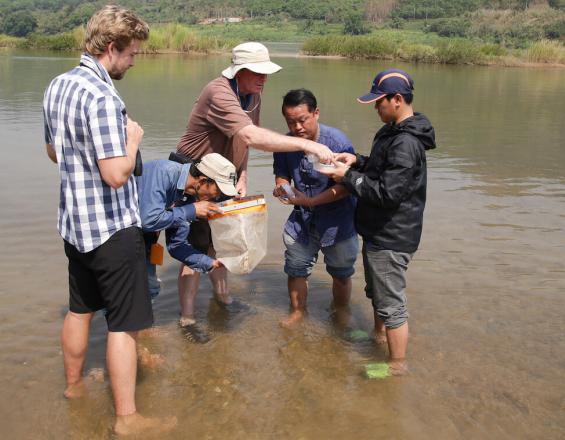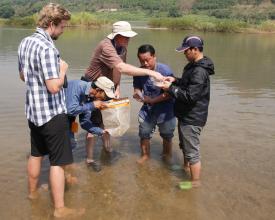
Estudio medioambiental del Plan de Desarrollo del Lancang-Mekong

El estudio evaluó los posibles impactos ambientales y sociales del Plan de Desarrollo Lancang-Mekong (LMDP) y del Proyecto Hidroeléctrico Pak Beng propuestos y formuló recomendaciones para mejorar la planificación y gestión de estos desarrollos con el fin de mitigar eficazmente los impactos negativos. El estudio se llevó a cabo en cuatro fases (determinación del alcance, evaluación de referencia, evaluación del impacto y recomendaciones y planificación de la gestión) y abarcó siete áreas temáticas:
- Hidrología y sedimentos;
- Biodiversidad acuática y humedales;
- Peces;
- Anfibios y reptiles;
- Aves;
- Vías navegables; y
- Socioeconomía y medios de subsistencia.
Al determinar las posibles repercusiones del proyecto y establecer estrategias de mitigación, el estudio sirvió para informar a los responsables de la toma de decisiones. Es posible que haya contribuido a lograr un acuerdo informal entre Tailandia y China para detener el plan.
Contexto
Défis à relever
Ubicación
Impactos
El proyecto sentó las bases para mejorar el desarrollo sostenible y la gestión del río Lancang-Mekong entre el Triángulo de Oro y Luang Prabang. Ayudó a mejorar la base de conocimientos sobre los valores sociales y medioambientales a lo largo de este tramo. Identificó los posibles impactos a corto y largo plazo de los desarrollos propuestos y esbozó un conjunto de estrategias de mitigación para minimizar los impactos negativos con el fin de salvaguardar la biodiversidad y los medios de vida y subsistencia de las comunidades locales.
Como siguiente paso tras el estudio y sus recomendaciones, la Secretaría de la Comisión del Río Mekong notificará formalmente a los países miembros el estudio y los materiales de recursos vinculados para que los países puedan decidir la mejor manera de avanzar en la integración de los resultados en sus respectivos planes de desarrollo de la navegación, la evaluación del impacto ambiental y social en el PDPM y el plan de gestión ambiental asociado.
El estudio fue una parte importante de la base de pruebas científicas que condujo a un acuerdo informal entre los ministros de Asuntos Exteriores de Tailandia y China para detener el plan en febrero de 2019. Sin embargo, como no ha habido ninguna declaración oficial de China o Tailandia sobre la cancelación del LMDP, es posible que el plan pueda continuar en una fecha posterior. Los resultados del estudio seguirán proporcionando información importante a los responsables de la toma de decisiones en caso de que se resucite el plan.
